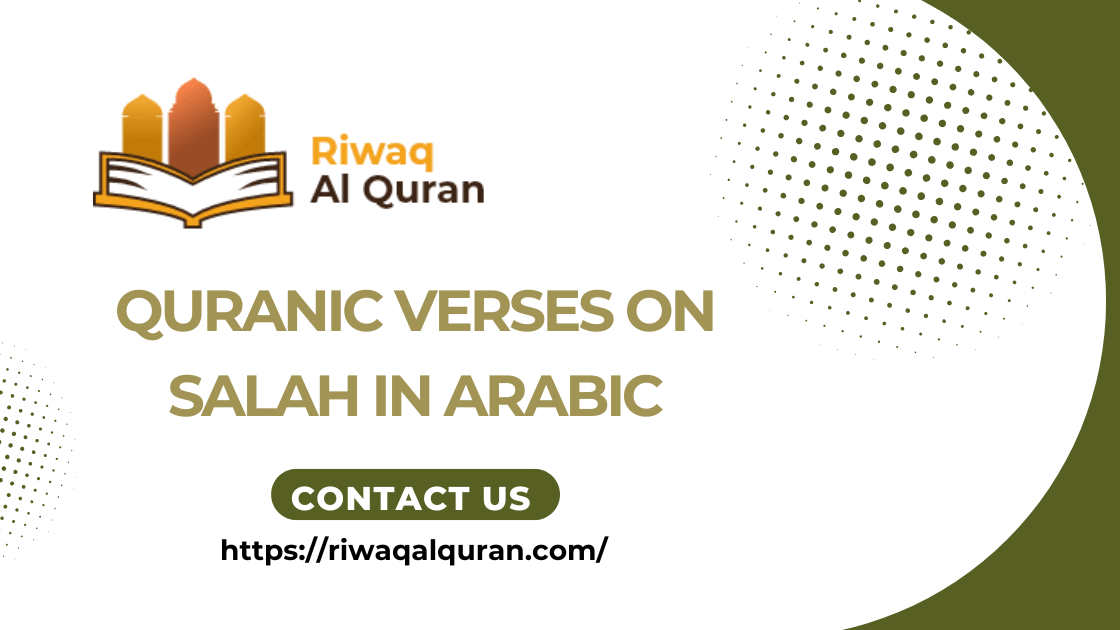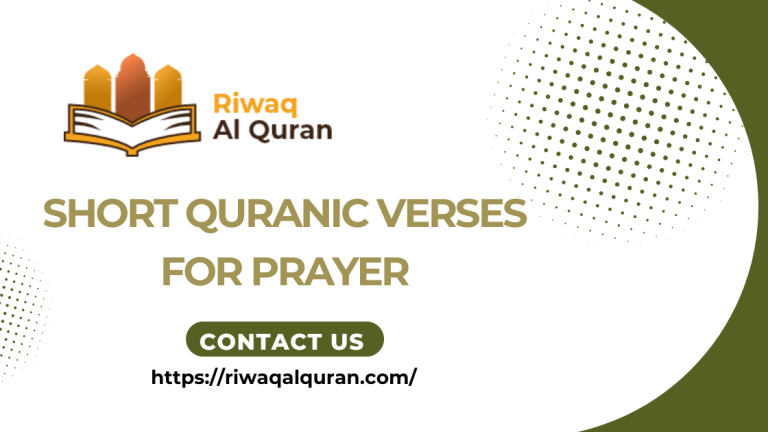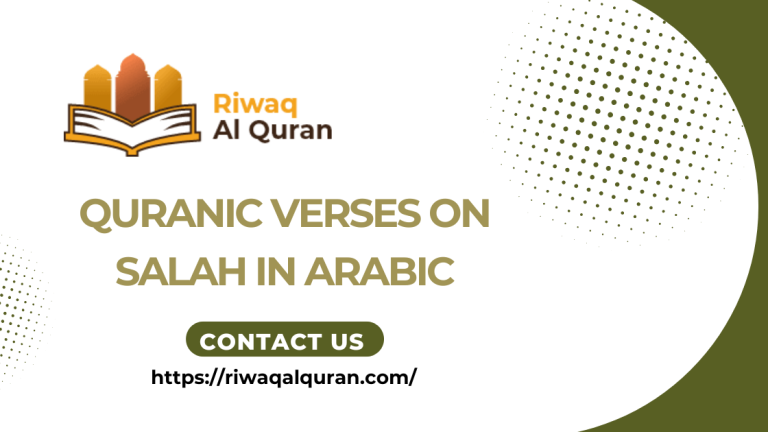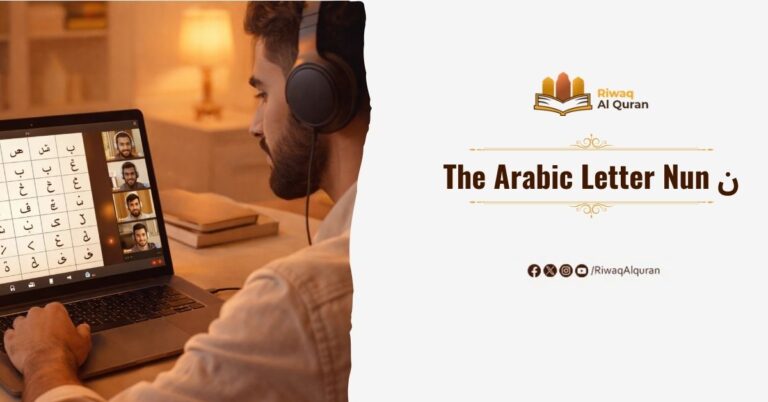Salah is a direct command from Allah, repeated across dozens of verses in the Quran with remarkable consistency and urgency. Understanding what Allah actually says about prayer deepens your connection to every rak’ah you perform, transforming obligatory acts into conscious worship.
The Quran addresses salah from multiple angles: its obligation, its timing, its spiritual function, and its consequences when neglected. Knowing these verses by heart gives your prayer a soul, and helps you internalize why each posture, each recitation, carries divine weight.
Table of Contents
1. Allah Commands Us to Guard Our Prayers
Surah Al-Baqarah contains one of the most direct commands about protecting your prayers from neglect or carelessness. This verse uses a specific word that distinguishes it from general commands to pray.
حَافِظُوا عَلَى الصَّلَوَاتِ وَالصَّلَاةِ الْوُسْطَىٰ وَقُومُوا لِلَّهِ قَانِتِينَ
Hafizoo ‘alas salawati was salatis wusta wa qoomoo lillahi qaniteen
“Maintain with care the [obligatory] prayers and [in particular] the middle prayer and stand before Allah, devoutly obedient.” (Al-Baqarah 2:238)
The verb حَافِظُوا (hafizoo) comes from the same root as “hafiz” — meaning to preserve, protect, and guard with vigilance.
The “middle prayer” (Asr, according to the strongest scholarly opinion) receives special emphasis, signaling that consistency across all times matters deeply.
| Quranic Term | Root | Meaning in Context |
| حَافِظُوا (Hafizoo) | ح-ف-ظ | Guard, preserve, protect with vigilance |
| قَانِتِينَ (Qaniteen) | ق-ن-ت | Devotedly obedient, humbly standing |
| وَالصَّلَاةِ الْوُسْطَىٰ | و-س-ط | The middle prayer (Asr, per majority opinion) |
Understanding these root words changes how you approach salah. Each term carries a behavioral instruction embedded in its linguistic structure — something only deep Quranic study reveals.
At Riwaq Al Quran, our Online Hifz Classes with certified Azhari tutors help students master the recitation quality needed to make every salah a true act of dhikr, with personalized 1-on-1 sessions tailored to your level.
Start your Hifz journey with a Free Trial

2. Establishing Prayer Is Inseparable From a Complete Islamic Identity
Allah commands Salah alongside zakah as a defining marker of the believer. Salah is listed repeatedly alongside zakah throughout the Quran, which scholars of Al-Azhar note is deliberate: it connects individual worship to communal responsibility.
The pairing appears about 30 times, reinforcing that salah is inseparable from a complete Islamic identity.
وَأَقِيمُوا الصَّلَاةَ وَآتُوا الزَّكَاةَ وَارْكَعُوا مَعَ الرَّاكِعِينَ
Wa aqeemus salata wa atuz zakata war ka’oo ma’ar raki’een
“And establish prayer and give zakah and bow with those who bow [in worship and obedience].” (Al-Baqarah 2:43)
The word أَقِيمُوا (aqeemoo) is critical. It does not mean simply “perform” — it means “establish” or “uphold,” implying consistency, correctness, and presence of heart.
At Riwaq Al Quran, the Online Tafseer Course helps students understand these nuanced differences through certified Azhari tutors who explain Quranic vocabulary in depth.
Enroll Now in Riwaq’s Tafseer Course
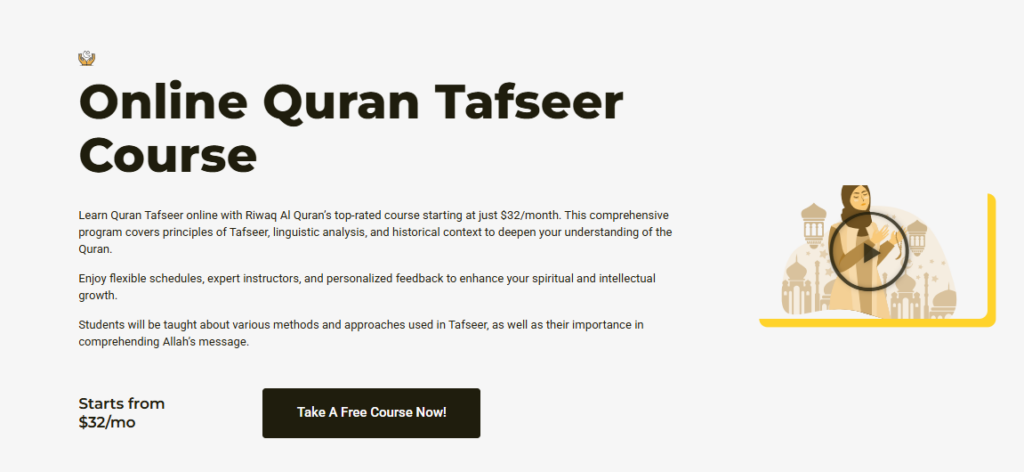
3. The Quranic Verse on Salah That Defines the Five Prayer Times
One of the most precisely structured verses about salah in the Quran is found in Surah Hud. It outlines the prayer times with remarkable conciseness, and classical scholars use it as a textual basis for the five daily prayers.
وَأَقِمِ الصَّلَاةَ طَرَفَيِ النَّهَارِ وَزُلَفًا مِّنَ اللَّيْلِ
Wa aqimis salata tarafayin nahari wa zulafan minal layl
“And establish prayer at the two ends of the day and at the approach of the night.” (Hud 11:114)
The phrase “two ends of the day” refers to Fajr and the afternoon/evening prayers, while “approach of the night” points to Maghrib and Isha.
Scholars explain this verse establishes temporal structure for worship, anchoring the Muslim’s entire day around salah.
4. Correctly Performed Prayer Protects You From Sin
Perhaps the most widely cited verse about salah’s function is found in Surah Al-Ankabut. It addresses the why of prayer — not just the mechanics, but the spiritual outcome Allah promises.
إِنَّ الصَّلَاةَ تَنْهَىٰ عَنِ الْفَحْشَاءِ وَالْمُنكَرِ
Innas salata tanha ‘anil fahsha’i wal munkar
“Indeed, prayer prohibits immorality and wrongdoing.” (Al-Ankabut 29:45)
This verse uses the present tense verb تَنْهَىٰ (tanha), indicating an active, ongoing prohibition. A correctly established prayer — with presence of heart, proper recitation, and Tajweed — actively restrains the soul from sin. This is why scholars teach that the quality of your salah reflects the quality of your character.
Working with qualified Azhari tutors at Riwaq Al Quran provides the individualized attention needed to improve Quranic recitation within salah, helping you experience this spiritual protection more deeply.
Get your personalized plan with Azhari Tutors

5. The Quran’s Sharpest Warning to Those Who Pray Without Presence of Heart
Not all verses on salah are commands to pray — some warn explicitly against those who pray carelessly or abandon it. Surah Al-Ma’un delivers one of the Quran’s sharpest rebukes regarding salah.
فَوَيْلٌ لِّلْمُصَلِّينَ ٱلَّذِينَ هُمْ عَن صَلَاتِهِمْ سَاهُونَ
Fawaylun lil musalleen, alladhina hum ‘an salatihim sahoon
“So woe to those who pray but are heedless of their prayer.” (Al-Ma’un 107:4–5)
The word سَاهُونَ (sahoon) means heedless, distracted, or neglectful — not necessarily someone who abandons prayer entirely.
This verse warns against praying without presence of heart or delaying prayers past their times. The scholars emphasize this verse as proof that how you pray matters as much as whether you pray.
| Category | Arabic Term | Scholar’s Description |
| Heedlessness in prayer | سَاهُونَ | Praying without focus or heart |
| Delaying prayers | تَأْخِيرُ الصَّلَاة | Missing the proper time window |
| Showing off in prayer | رِيَاء | Praying for people’s approval, not Allah’s |
This table categorizes the types of neglect referenced in classical tafsir of this verse. Each is treated as a spiritual disease requiring specific correction through awareness and practice.
6. Patience and Prayer Are the Believer’s Greatest Sources of Strength
Surah Al-Baqarah presents salah alongside patience as one of the two greatest tools available to the believer. This pairing is theologically significant and practically transformative.
وَاسْتَعِينُوا بِالصَّبْرِ وَالصَّلَاةِ وَإِنَّهَا لَكَبِيرَةٌ إِلَّا عَلَى الْخَاشِعِينَ
Wasta’eenoo bis sabri was salati wa innaha lakabiratun illa ‘alal khashi’een
“And seek help through patience and prayer, and indeed, it is difficult except for the humbly submissive [to Allah].” (Al-Baqarah 2:45)
The word الْخَاشِعِينَ (al-khashi’een) — those who are humbly submissive — appears across multiple salah-related verses.
Khushu’ (humility and focus in prayer) is not optional; it is the defining characteristic of those for whom salah becomes a source of strength rather than a burden.
7. Quranic verse for Humility in Prayer
Arabic: “رَبِّ اجْعَلْنِي مُقِيمَ الصَّلَاةِ وَمِن ذُرِّيَّتِي”
Transliteration: “Rabbi aj‘alnī muqīma aṣ-ṣalāh wa min dhurriyatī”
Translation: “My Lord, make me firm in prayer and my descendants [as well].” (Qur’an 14:40)
8. Quranic verse for Acceptance of Prayer
Arabic: “تَقَبَّلْ مِنَّا إِنَّكَ أَنتَ السَّمِيعُ العَلِيمُ”
Transliteration: “Taqabbal minnā innaka anta as-samī‘u al-‘alīm”
Translation: “Accept from us; indeed, You are the Hearing, the Knowing.” (Qur’an 2:127)
Experience Riwaq Al Quran Classes
Watch real moments from our live sessions at Riwaq Al Quran and see how we bring learning to life. These clips highlight our interactive, student-focused approach designed to keep learners engaged, motivated, and actively involved in every step of their educational journey.
9. Quranic verse for Seeking Forgiveness
Arabic: “رَبَّنَا ظَلَمْنَا أَنفُسَنَا وَإِن لَّمْ تَغْفِرْ لَنَا وَتَرْحَمْنَا لَنَكُونَنَّ مِنَ الْخَاسِرِينَ”
Transliteration: “Rabbana ẓalamnā anfusana wa in lam taghfir lanā wa tarḥamnā lanakūnanna mina al-khāsirīn”
Translation: “Our Lord, we have wronged ourselves, and if You do not forgive us and have mercy upon us, we will surely be among the losers.” (Qur’an 7:23)
10. Quranic verse for Guidance
Arabic: “ٱهْدِنَا ٱلصِّرَٰطَ ٱلْمُسْتَقِيمَ”
Transliteration: “Ihdinā aṣ-ṣirāṭ al-mustaqīm”
Translation: “Guide us to the straight path.” (Qur’an 1:6)
11. Quranic verse for Steadfastness in Prayer
Arabic: “وَالَّذِينَ هُمْ عَلَىٰ صَلَاتِهِمْ يُحَافِظُونَ”
Transliteration: “Wa alladhīna hum ʿalā ṣalātihim yuḥāfiẓūn”.
Translation: “And they who [carefully] maintain their prayer.”
(Surah Al-Mu’minun 23:9)
12. Quranic verse to Seek Allah’s Help
Arabic: “يَا أَيُّهَا الَّذِينَ آمَنُوا اسْتَعِينُوا بِالصَّبْرِ وَالصَّلَاةِ ۚ إِنَّ اللَّهَ مَعَ الصَّابِرِينَ”
Transliteration: “Yā ayyuhā alladhīna āmanū istaʿīnū biṣ-ṣabri waṣ-ṣalāh, inna Allāha maʿa aṣ-ṣābirīn”.
Translation: “O you who have believed, seek help through patience and prayer. Indeed, Allah is with the patient.”
(Surah Al-Baqarah 2:153)
13. Quranic verse for Peace of Heart During Prayer
Arabic: “قَدْ أَفْلَحَ الْمُؤْمِنُونَ الَّذِينَ هُمْ فِي صَلَاتِهِمْ خَاشِعُونَ”
Transliteration: “Qad aflaḥa al-mu’minūn. Alladhīna hum fī ṣalātihim khāshiʿūn”.
Translation: “Certainly will the believers have succeeded: They who are humble in their prayers.”
(Surah Al-Mu’minun 23:1–2)
14. Quranic verse for Allah’s Mercy
Arabic: “رَبَّنَا ظَلَمْنَا أَنفُسَنَا فَاغْفِرْ لَنَا وَارْحَمْنَا”
Transliteration: “Rabbana ẓalamnā anfusana faghfir lanā warḥamnā”
Translation: “Our Lord, we have wronged ourselves, so forgive us and have mercy upon us.” (Qur’an 7:23)
15. Quranic verse for Thankfulness After Prayer
Arabic: “الْحَمْدُ لِلَّهِ رَبِّ الْعَالَمِينَ”
Transliteration: “Al-ḥamdu lillāhi rabbi al-‘ālamīn”
Translation: “All praise is due to Allah, Lord of the worlds.” (Qur’an 1:2)
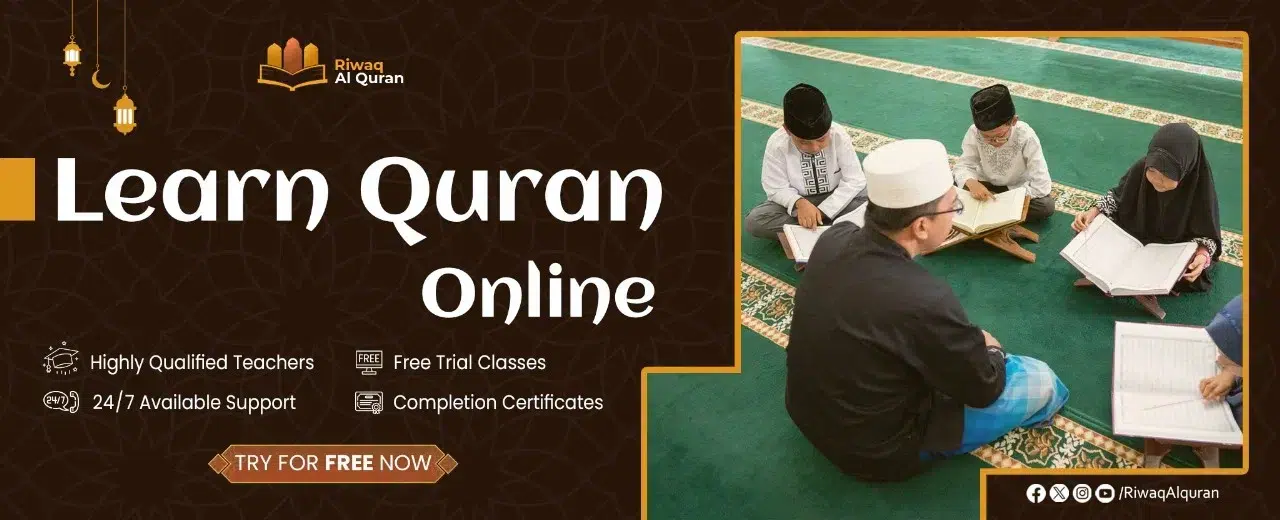
The Power and Significance of Dua for Salah
Prayer (Salah) is the heart of a Muslim’s daily worship, the direct link between the servant and Allah. In Islam, one of the most powerful ways to deepen this connection and seek acceptance of our prayers is through dua. Dua during or related to Salah is not merely a request—it is a humble call to the One who controls all outcomes and whose mercy encompasses everything.
It Is a Form of Worship
The Prophet ﷺ said,
“Dua is worship.” (Tirmidhi)
When a believer raises their hands and calls upon Allah to perfect their prayer, they engage in one of the most honored and intimate acts of devotion in Islam.
The Dua for Salah Is Always Heard
The Prophet ﷺ said,
“The first matter that the slave will be brought to account for on the Day of Judgment is the prayer. If it is sound, then the rest of his deeds will be sound. And if it is defective, then the rest of his deeds will be defective.” (Al-Tabarani)
This shows the high importance Allah places on prayer and the duas related to it—highlighting how pivotal sincere supplication in Salah is to our overall spiritual state.
It Is a Lifelong Investment
Every prayer you perform and every dua you make asking Allah to accept and improve your Salah becomes a spiritual treasure that benefits you throughout your life and in the Hereafter. Your consistent dua strengthens your relationship with Allah and guards your prayers from negligence and distraction.
It Strengthens Tawakkul (Trust in Allah)
While we strive to pray with concentration and devotion, we cannot fully control the acceptance or the reward of our prayers. Dua reminds us that Allah is the ultimate Judge and Guide, the One who perfects our deeds and writes our destinies. Through dua, we place our trust completely in Him.
The Islamic View on Salah and Dua
Salah is an obligation and a trust (amanah) from Allah that reflects a Muslim’s submission and faith. Making dua related to Salah nurtures this spiritual responsibility and renews our commitment to perform it sincerely. Dua brings Allah into every moment of prayer—from preparation to completion—inviting His mercy, guidance, and acceptance.
Qur’anic and Prophetic Examples
Even the greatest of prophets made dua to perfect their prayers:
Prophet Ibrahim (A.S.):
“My Lord, make me an establisher of prayer, and from my descendants.”
(Qur’an 14:40)
The Prophet Muhammad ﷺ himself taught many duas to say during Salah to help deepen our connection with Allah and maintain khushu’ (humility and focus).
Their sincere supplications not only shaped their spirituality but also set a timeless example for all believers. That’s the power of dua in Salah—it can transform the quality of worship and echo across generations.
The best Islamic Studies Online Courses start with Riwaq.
Practical Steps to Complement Your Duas
While making dua is a powerful act of worship, Islam teaches us that supplication should be paired with sincere effort and practical steps. Here are some actionable tips to help you strengthen your connection to Allah and enhance your prayers:
1. Perform Salah on Time
Praying each of the five daily prayers promptly shows discipline and dedication. Timely prayers cultivate a routine that deepens your spiritual connection and ensures your duas are made in the best moments.
2. Learn the Meanings of the Duas and Verses
Understanding what you recite during prayer helps increase concentration (khushu’) and makes your dua more heartfelt and meaningful. Take time to study the meanings and ask knowledgeable teachers if needed.
Read Also: Top Quranic Verses On Helping the Needy
3. Create a Quiet and Clean Space for Prayer
Minimizing distractions allows you to focus better during salah and dua. A clean, peaceful environment encourages mindfulness and reverence.
4. Repeat and Reflect
Don’t rush through your duas or prayers. Repeat important duas slowly and reflect on their meanings. This reflection strengthens your sincerity and connection with Allah.
Read Also: Quranic Verses on Zakat: A Guide to Giving and Spiritual Growth
5. Maintain Consistency
Make dua regularly, not only during prayer but also throughout your day. Consistency builds spiritual resilience and reminds you to keep turning to Allah in all circumstances.
Read Also: Short Quranic Verses for Prayer
6. Combine Dua with Action
If your dua involves seeking justice, forgiveness, or guidance, also take the necessary steps in your life—whether that’s seeking knowledge, making amends, or improving your behavior. Dua empowers your efforts.
Read Also: Top Quranic Verses on Marriage


Read Also: Best Quranic Verses Related to Justice
Learn Quran and Islamic Studies with Riwaq Al Quran
Learn Quran and Islamic Studies with Riwaq Al Quran.
Making dua for a better and more meaningful Salah is a beautiful start—but the next essential step is gaining a deep understanding and proper practice. At Riwaq Al Quran, we empower learners of all ages to strengthen their connection with Allah through expert-led Quranic and Islamic education.
Whether you want to improve your prayer, master Quranic recitation, or deepen your knowledge of Islam, Riwaq Al Quran provides compassionate, qualified teachers to guide you every step of the way.
What We Offer:
- One-on-One Quran Classes—Personalized attention to perfect recitation and memorization
- Tajweed and Recitation Courses: Learn to pronounce every letter and verse with confidence
- Islamic Studies for All Ages: Understand prayer, duas, stories of the Prophets, and more.
- Flexible Scheduling: Study anytime, anywhere, at your own pace
- Certified and Experienced Instructors: Trusted by thousands of students worldwide
Why Riwaq Al Quran?
Because every sincere dua to improve your Salah deserves the support of knowledge and guidance. Our mission is to help you turn your prayers into real progress, nurturing your faith, understanding, and devotion.
“O Allah, make my prayer accepted and my heart humble.”
At Riwaq Al Quran, we help bring that dua to life.
Ready to Begin?
Enroll now and take the next step in your Quranic and Islamic learning journey.
Can I Say These Quranic Verses in English, or Do They Have to Be in Arabic?
Yes, you can say duas related to Salah in English or any language you feel comfortable with—especially if you are still learning Arabic or want to understand the meaning deeply. What truly matters is the sincerity and devotion in your heart when making dua.
Why Arabic Is Recommended:
Many duas, including those from the Qur’an and Sunnah, are in Arabic because this preserves their precise wording, rhythm, and spiritual depth. Reciting in Arabic also helps you connect directly with the language of the Qur’an and enhances your spiritual experience.
Why English (or any language) is still valid:
If you have not yet mastered Arabic, it is completely acceptable to make dua in your native language. Allah understands all languages and knows your intentions before you even utter the words.
Tip: Learn the Arabic dua line by line alongside its translation. This approach helps you memorize the dua while fully grasping its beautiful meaning and significance.
Get the best Islamic Studies Online Course
Why Students Love Learning with Riwaq Al Quran
Hear directly from our students about how Riwaq Al Quran Academy has transformed their connection with the Book of Allah. Their experiences reflect the dedication, care, and quality that guide every step of our teaching.
How Can I Help My Child Learn These Verses?
Helping your child learn duas for Salah and daily life is a wonderful way to nurture their spiritual growth and build a lifelong connection with Allah. Here are some simple and effective ways to support your child in memorizing and understanding these duas:
Use Repetition and Rhythm
Children remember best when they hear something frequently and in an engaging way. Recite the duas regularly with your child using a gentle, melodic tone to make it enjoyable.
Connect Duas to Daily Activities
Link each dua to a specific routine, like saying a particular dua before prayer, before eating, or before sleeping. This helps your child remember them naturally through habits.
Use Visual Aids and Videos
Colorful flashcards, illustrated books, and animated videos can make learning duas more engaging and easier to memorize.
Lead by Example
Let your child see you making dua regularly. Children imitate what they observe, so your sincere practice will inspire them.
Explain the Meaning. Simply
Help your child understand what each dua means in age-appropriate language. When they know they are asking Allah for protection, guidance, or mercy, the dua becomes more meaningful.
Start Small and Build Gradually
Begin with one short dua at a time, then gradually add more. Celebrate their progress with praise and encouragement to keep them motivated.
With patience, love, and consistency, your child will not only memorize these duas but also develop a heartfelt habit of turning to Allah in all circumstances.
Explore Our Quran Kids Courses Now—and choose from a wide variety of programs tailored for every level:
- Quran Recitation Course for Kids
- Quran Memorization (Hifz) Course
- Tajweed for Kids
- Islamic Studies for Kids
- Dua and Hadith Memorization Course
- Arabic Language for Kids
Let your child embark on their learning journey with qualified teachers, structured lessons, and a lasting love for Islam.
Explore Our Quran Kids Courses Now

Read Also: Quranic Verses On Positive Thinking In Arabic And English
Learn Quran, Arabic And Islamic Studies Online With The Best Native Tutors
Riwaq Al Quran is a comprehensive online platform that offers personalized Quran, Arabic and Islamic Studies Online classes for individuals of all ages and backgrounds.
Their experienced instructors use a structured curriculum to cover Tajweed, Tafsir, and Memorization, providing easy and effective access to learning the Quran.
The advanced online classes allow for seamless communication and interaction between students and teachers. Join Riwaq Al Quran for a deeper connection with the Quran.
We offer several courses such as:
- Online courses for kids.
- Online Quran classes for kids and adults.
- Online Arabic courses
- Online Ijazah courses
- Online Islamic Studies courses.
Here are a sample of our set of Quran Courses that will be helpful for you:
- Online Tafseer Course: Delve into Quranic meanings with our insightful online Tafseer course.
- Noorani Qaida Online: Learn Quranic basics efficiently through our Noorani Qaida online program.
- Online Quran Recitation Course: Enhance Quranic recitation skills through our expert-led online course.
- Online Tajweed Classes: Master Tajweed rules for beautiful Quranic recitation in online classes.
- Quran Memorization Online Course: Memorize the Quran effectively with our specialized online memorization course.
- Online Qirat Course: Explore diverse Qirat styles with our comprehensive online Qirat course.
- Online Quran Classes for Kids: Nurture a love for the Quran in kids through interactive online classes.
Enroll now for 2 Free Trial Classes and Begin Memorizing Quran Today.

Conclusion
In conclusion, dua for Salah is a powerful tool that strengthens our spiritual connection with Allah and deepens the sincerity of our worship. Through heartfelt supplication, we seek not only acceptance of our prayers but also guidance, humility, and steadfastness in our faith. Making dua reminds us that while we do our best in performing Salah, it is ultimately Allah who perfects and rewards our efforts.
Combining dua with consistent practice, understanding, and sincere effort creates a balanced approach to worship that nurtures both the heart and mind. By turning to Allah with trust and devotion, we open ourselves to His mercy and blessings, knowing that every prayer, every dua, and every moment spent seeking Him brings us closer to success in this life and the Hereafter.

